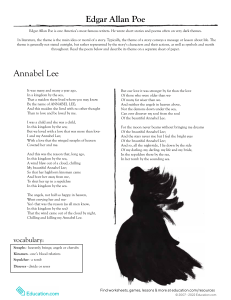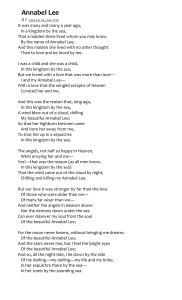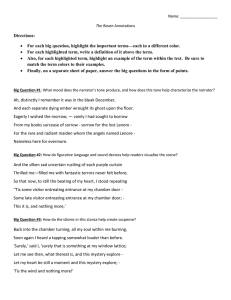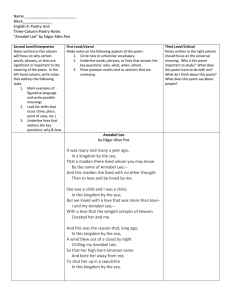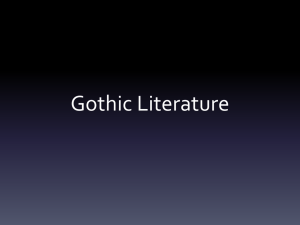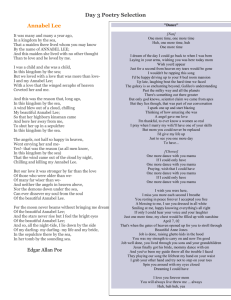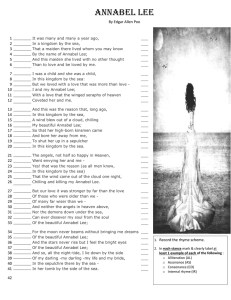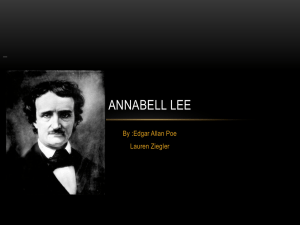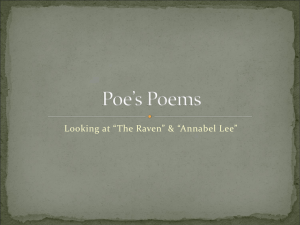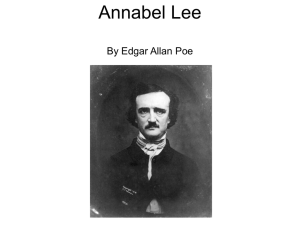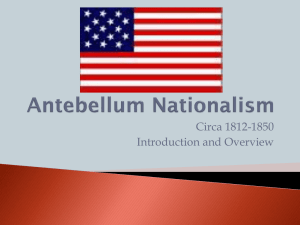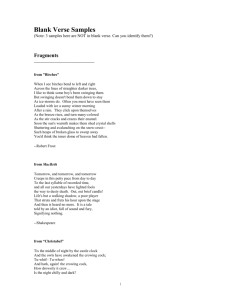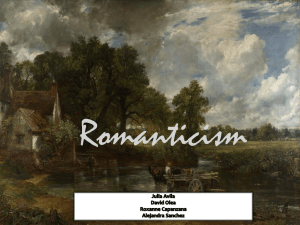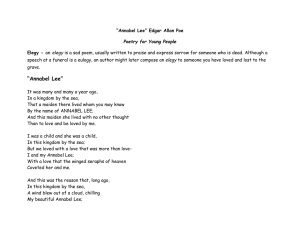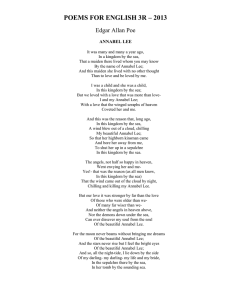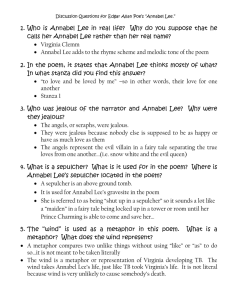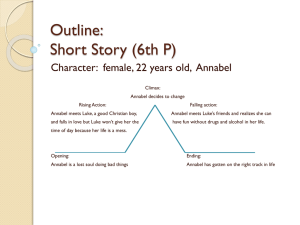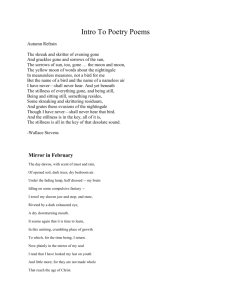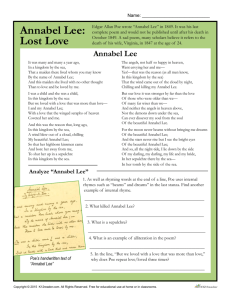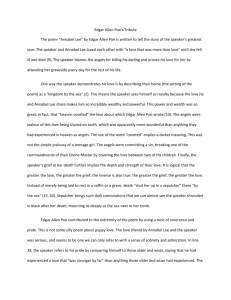Gothic Fiction/Poetry The first gothic work to be written by Horace
advertisement
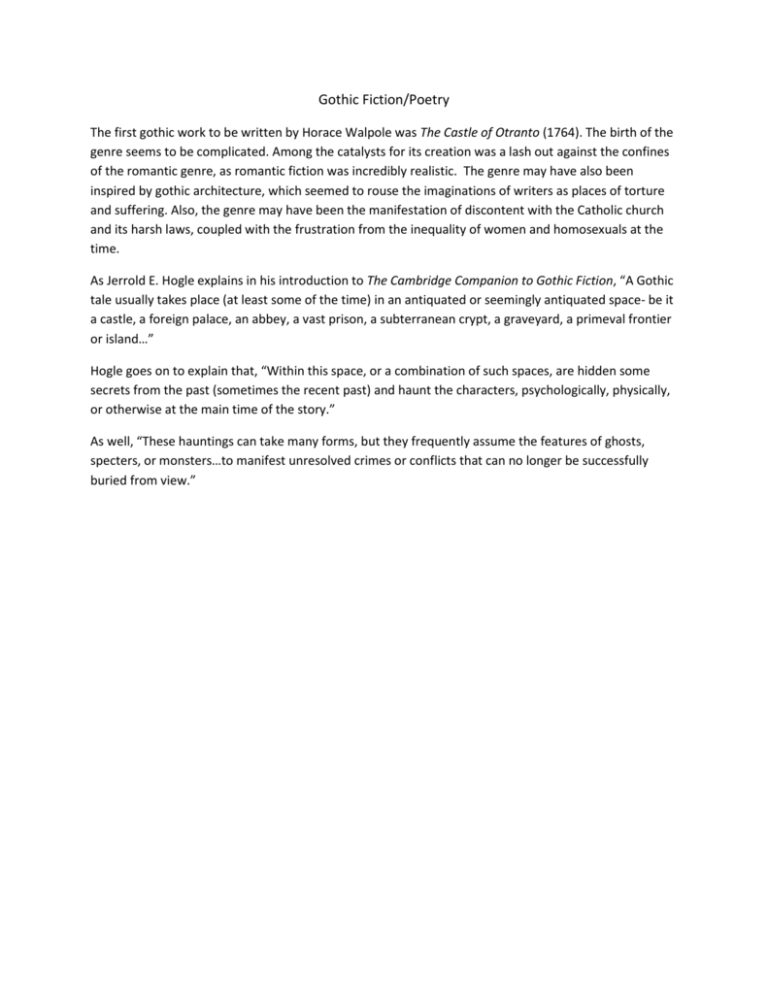
Gothic Fiction/Poetry The first gothic work to be written by Horace Walpole was The Castle of Otranto (1764). The birth of the genre seems to be complicated. Among the catalysts for its creation was a lash out against the confines of the romantic genre, as romantic fiction was incredibly realistic. The genre may have also been inspired by gothic architecture, which seemed to rouse the imaginations of writers as places of torture and suffering. Also, the genre may have been the manifestation of discontent with the Catholic church and its harsh laws, coupled with the frustration from the inequality of women and homosexuals at the time. As Jerrold E. Hogle explains in his introduction to The Cambridge Companion to Gothic Fiction, “A Gothic tale usually takes place (at least some of the time) in an antiquated or seemingly antiquated space- be it a castle, a foreign palace, an abbey, a vast prison, a subterranean crypt, a graveyard, a primeval frontier or island…” Hogle goes on to explain that, “Within this space, or a combination of such spaces, are hidden some secrets from the past (sometimes the recent past) and haunt the characters, psychologically, physically, or otherwise at the main time of the story.” As well, “These hauntings can take many forms, but they frequently assume the features of ghosts, specters, or monsters…to manifest unresolved crimes or conflicts that can no longer be successfully buried from view.” Annabel Lee Edgar Allan Poe It was many and many a year ago, In a kingdom by the sea, That a maiden there lived whom you may know By the name of ANNABEL LEE; And this maiden she lived with no other thought Than to love and be loved by me. I was a child and she was a child, In this kingdom by the sea; But we loved with a love that was more than loveI and my Annabel Lee; With a love that the winged seraphs of heaven Coveted her and me. And this was the reason that, long ago, In this kingdom by the sea, A wind blew out of a cloud, chilling My beautiful Annabel Lee; So that her highborn kinsman came And bore her away from me, To shut her up in a sepulchre In this kingdom by the sea. The angels, not half so happy in heaven, Went envying her and meYes!- that was the reason (as all men know, In this kingdom by the sea) That the wind came out of the cloud by night, Chilling and killing my Annabel Lee. But our love it was stronger by far than the love Of those who were older than weOf many far wiser than weAnd neither the angels in heaven above, Nor the demons down under the sea, Can ever dissever my soul from the soul Of the beautiful Annabel Lee. For the moon never beams without bringing me dreams Of the beautiful Annabel Lee; And the stars never rise but I feel the bright eyes Of the beautiful Annabel Lee; And so, all the night-tide, I lie down by the side Of my darling- my darling- my life and my bride, In the sepulchre there by the sea, In her tomb by the sounding sea. My Last Duchess Robert Browning That's my last duchess painted on the wall, Looking as if she were alive. I call That piece a wonder, now: Frà Pandolf's hands Worked busily a day, and there she stands. Will't please you sit and look at her? I said "Frà Pandolf" by design, for never read Strangers like you that pictured countenance, The depth and passion of its earnest glance, But to myself they turned (since none puts by The curtain I have drawn for you, but I) And seemed as they would ask me, if they durst, How such a glance came there; so, not the first Are you to turn and ask thus. Sir, 'twas not Her husband's presence only, called that spot Of joy into the Duchess' cheek: perhaps Frà Pandolf chanced to say "Her mantle laps "Over my lady's wrist too much," or "Paint "Must never hope to reproduce the faint "Half-flush that dies along her throat": such stuff Was courtesy, she thought, and cause enough For calling up that spot of joy. She had A heart how shall I say? too soon made glad, Too easily impressed; she liked whate'er She looked on, and her looks went everywhere. Sir, 'twas all one! My favor at her breast, The dropping of the daylight in the West, The bough of cherries some officious fool Broke in the orchard for her, the white mule She rode with round the terrace all and each Would draw from her alike the approving speech, Or blush, at least. She thanked men good! but thanked Somehow I know not how as if she ranked My gift of a nine-hundred-years-old name With anybody's gift. Who'd stoop to blame This sort of trifling? Even had you skill In speech which I have not to make your will Quite clear to such an one, and say, "Just this "Or that in you disgusts me; here you miss, "Or there exceed the mark" and if she let Herself be lessoned so, nor plainly set Her wits to yours, forsooth, and make excuse, E'en then would be some stooping; and I choose Never to stoop. Oh sir, she smiled, no doubt, Whene'er I passed her; but who passed without Much the same smile? This grew; I gave commands; Then all smiles stopped together. There she stands As if alive. Will't please you rise? We'll meet The company below, then. I repeat, The Count your master's known munificence Is ample warrant that no just pretense Of mine for dowry will be disallowed; Though his fair daughter's self, as I avowed At starting, is my object. Nay we'll go Together down, sir. Notice Neptune, though, Taming a sea-horse, thought a rarity, Which Claus of Innsbruck cast in bronze for me!
